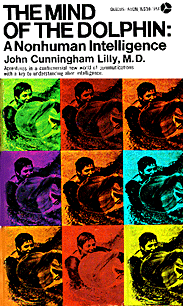|
Library of Congress CCN 67-10417 CHAPTER 07 |
Once one has been through deep experiences in tune with the vast forces of the universe, the vast forces within ourselves, we see that the need for conflict, the need for hostility, and the need for hatred become less intense. One finds the universe inside and the one outside so vast and so lonely that any other living thing that loves or shows any signs of loving is precious and close. One's own inner discontents show up as the trivial conflicts that they really are. Time on this earth is of immense value beyond the small grievances, the hickerings, the complaints, the encroachments, and the fools. Time here is for exploration of the unknowns. If, at the time of the death of each of our bodies, the spirit also dies, then this time is incredihly precious. It's all the time we have for each one of us. If the spirit lives on, here or elsewhere and continues to send and receive information, this time may also be precious and incredibly important. Our behavior, our achievements, the marks that we make now may or may not determine what sort of an after life we may have. I don't know which of these alternatives is the real truth. I do know that it is important to spend our time now on important projects. The so-called scientific pragmatist in me says that I die with the
death of my body. The sensitive humanist in me says there are vast areas
of ignorance and of ignorings in John Van Neumann said of arithmetic that addition subtraction-multiplication-division were accidental discoveries; that we are caught in their tradition as the basis of our mathematics; that if only we had first discovered something else, more powerful, intellectually, and more like the brain's own mathematics, we wonld he much farther ahead. So would all of our knowledge. We are aided and yet we are also handicapped by what we know, by the amounts we know and by what remams to be known. We tend to say that what we know is all there is to know. Ohviously this is nonsense and it is nonsense in arithmetic as well as it is nonsense in the knowledge of the basic particles of the universe. Our current knowledge is a very thin closed shell surrounding our minds with vast unknowns inside it and outside it. |





